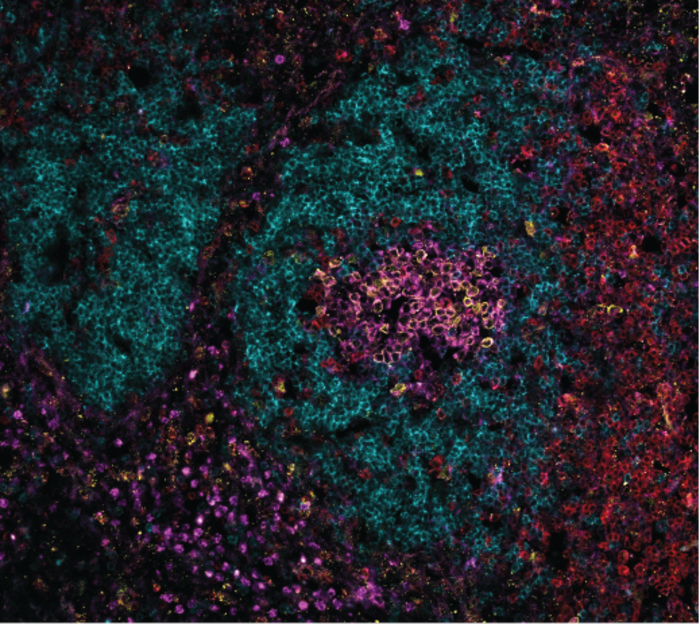Chronic infectious diseases have a devastating effect on global health. When someone is suffering from a chronic viral infection such as HIV or hepatitis C, their B cells get altered resulting in low-quality antibodies that are not strong enough to help the body clear the infection.

Credit: (C) Professor Kim Good-Jacobson
Chronic infectious diseases have a devastating effect on global health. When someone is suffering from a chronic viral infection such as HIV or hepatitis C, their B cells get altered resulting in low-quality antibodies that are not strong enough to help the body clear the infection.
A recent study in mice conducted by the Monash Biomedicine Discovery Institute (BDI), has uncovered that during chronic viral infection, a protein called BMI-1 gets turned on too early in B cells and messes up the delicate balance of gene expression, resulting in antibodies that are unsuccessful in their endeavour to clear the virus from the body.
However, when this protein is targeted, the nature of the B cell can be changed to produce a higher quality antibody that accelerates clearance of a virus and may provide a new therapeutic pathway to help improve and regulate the body’s antibody response to achieve better outcomes.
The findings have now been published in Nature Immunology.
B cells, a type of white blood cell, respond to infection and can eventually turn into plasma cells. It is the plasma cells that make and secrete antibodies. During an infection, some of the B cells that become activated can quickly become plasma cells and start to produce antibodies in the first few days of the body’s immune response. While these antibodies are helpful, they are typically lower in quality and do not clear the infection. However, they do give the immune system some time to allow other B cells to undergo a “training period” to become high-quality memory B cells and plasma cells for immunity.
The memory B cells will act as sentinels for a long time, on guard for the next time the body gets infected with the same pathogen. If reinfected, they can quickly turn into plasma cells and make high-quality antibodies without having to undergo the training again, which helps your body clear the infection quicker and are the reason why vaccines work.
When a patient can’t clear the infection, the immune response reacts by altering the balance in favour of producing antibodies faster, without the adequate training it needs to neutralise the virus and form protective memory B cells and plasma cells.
Lead researcher Associate Professor Kim Good-Jacobson said being able to modulate abnormal antibody responses to accelerate viral clearance and reduce disease in chronic infection has significant benefits to patients and the burden of disease.
“We haven’t been able to produce effective vaccines for several chronic viral infections that can cause long-term health problems for millions of people. We wanted to figure out how antibody responses get disrupted, so we could start to identify targets to regulate the antibody response for better outcomes,” said Associate Professor Good-Jacobson.
“Memory immune cells and high-quality antibodies are powerhouses underpinning immune protection provided by successful vaccines, so working on ways to deliver drugs directly to B cells to improve the antibody response without affecting how well other immune cells work is crucial.”
Read the full paper in Nature Immunology titled: Targeting BMI-1 in B cells restores effective humoral immune responses and controls chronic viral infection
DOI: 10.1038/s41590-021-01077-y
For media enquiries please contact:
T: +61 (0) 425 725 836
For more Monash media stories, visit our news and events site
About the Monash Biomedicine Discovery Institute at Monash University
Committed to making the discoveries that will relieve the future burden of disease, the newly established Monash Biomedicine Discovery Institute at Monash University brings together more than 120 internationally renowned research teams. Spanning six discovery programs across Cancer, Cardiovascular Disease, Development and Stem Cells, Infection and Immunity, Metabolism, Diabetes and Obesity, and Neuroscience, Monash BDI is one of the largest biomedical research institutes in Australia. Our researchers are supported by world-class technology and infrastructure, and partner with industry, clinicians and researchers internationally to enhance lives through discovery.
Journal
Nature Immunology
DOI
10.1038/s41590-021-01077-y
Method of Research
Experimental study
Subject of Research
Animals
Article Title
Targeting BMI-1 in B cells restores effective humoral immune responses and controls chronic viral infection
Article Publication Date
29-Nov-2021




